The Meaning of Kosher
If you’re unfamiliar with what the term kosher means, you are not alone. Unless you are someone who eats kosher food, you may have never heard of it. There are also common kosher misconceptions, including:
- Myth: Kosher foods have been blessed by a rabbi. While food blessing is part of the Jewish culture, it does not make a food kosher.
- Myth: Kosher foods are made kosher when they are prepared. Actually, kosher foods must start as kosher foods and follow a kosher process from inception to table.
- Myth: “Kosher-style” foods are kosher. Again, this is a misunderstanding. Kosher-style foods may use authentic Jewish recipes, but may not be made from kosher ingredients.
- Myth: Kosher foods may be eaten with non-kosher foods. Kosher foods that touch non-kosher foods become non-kosher by proxy, and are therefore forbidden.
- Myth: Kosher foods can be made in any kitchen. Kosher ingredients should be handled with great care, and only in production locations that are retrofitted for kosher cooking and serving.
- Myth: Kosher foods are only eaten by those practicing the Jewish faith. Many people prefer to eat kosher for health reasons, even if they are not driven by a religious or cultural desire.
- Myth: Kosher foods are the same as “natural” foods. While natural foods may indeed be kosher, there is no expectation that they will be.
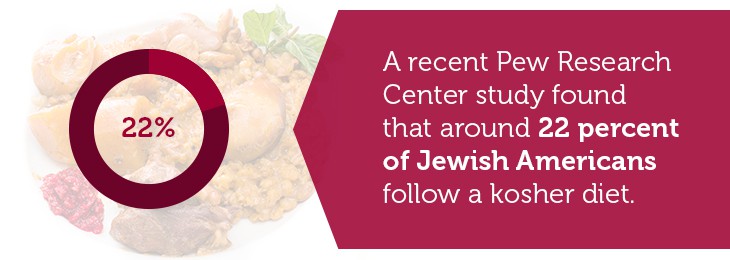
In order to understand the full spectrum of kosher eating, it’s important to start with a deeper understanding of the meaning of kosher.
A Brief History of the Kosher Label
The Torah is the religious book of the Jewish peoples. Those of the Christian faith will recognize many of the books and stories, as the Christian Old Testament and the Torah mirror one another in several circumstances.
In the books of Leviticus and Deuteronomy, Jewish law, or kashrut, as it relates to food and diet, is discussed. From those laws, Jewish followers are given a list of ways to ensure what they put into their bodies is fully “kasher,” which is the precursor to our word “kosher,” and not “treif,” which is non-kosher. “Kasher” means “fit,” as in “fit to be eaten.”
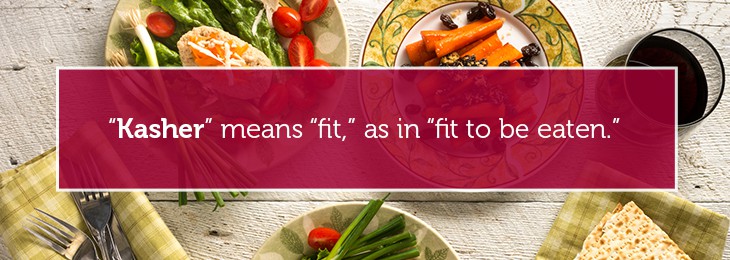
How can we tell when something is kasher? It begins kasher and must follow specific steps to remain that way. This includes everything from the way it is grown, harvested and/or raised, to the utensils and culinary tools used before it is consumed.
Some of the basic guidelines for kosher foods involve:
- Making sure meat and dairy are never mixed. This is strictly forbidden under kosher law, and a mistake could turn the foods and anything that has touched them, including utensils, non-kosher.
- Making sure animals are slaughtered according to acceptable kosher laws, and by a shochet (butcher). The slaughtering is done using a knife that is incredibly sharp. The knife cannot contain even the tiniest of nicks. The goal is for the animal to lose consciousness very quickly, rather than suffer a violent end. Plus, this type of ethical slaughtering ensures that the blood leaves the creature’s body cleanly.
- Making sure no blood from any animal is eaten or added during the preparation of food. This is very important from a Jewish law standpoint, because blood is seen as the basis of the creature’s life.
- Making sure eggs only come from kosher birds. Kosher birds include chickens, ducks and other domesticated species. Some families eat turkeys, too, while others are concerned that turkeys (not specifically mentioned in the Torah) could be non-kosher.
- Making sure different pots, pans, dishes and utensils are used for meat and dairy foods. These tools must never touch one another, even during wash. Thus, kosher kitchens often have two sinks, two dishwashers, two ovens, two microwaves, two refrigerators, two pantries and so on. Plus, every kosher household must have separate eating dishes for their meat and dairy ingredients.
- Making sure meat and dairy are not consumed together. After eating meat, a period of three to six hours must pass before eating dairy. After eating dairy, meat may be immediately eaten after the mouth has been thoroughly rinsed to remove dairy residue.
This is not a full list, but gives a basic illustration of the complex nature of kosher foods. It takes self-discipline, which is one of its benefits. Those who can focus on remaining true to Jewish law may find they are better able to concentrate on other areas of their lives, like their education, career path and, most certainly, family connections.
A Basic List of Kosher Foods
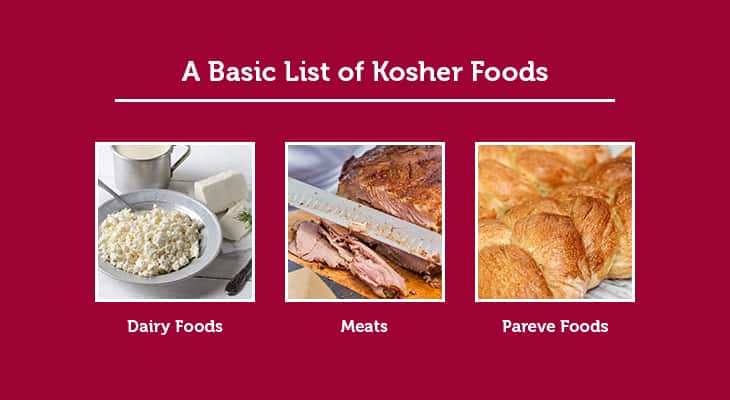
The following are considered kosher food products:
- Dairy Foods: This includes milk, yogurt, cheeses (not made with rennet, which comes from animals and would therefore be a taboo mixture of meat and dairy) and ice cream. Dairy foods must come from an acceptable source. For example, because camels are not allowed to be killed and eaten under kosher rules, camel milk cannot be drunk by those following a kosher diet. However, milk from goats and dairy cows is permissible. Be aware of these distinctions, especially if you’re buying milk or dairy from an uncertified source.
- Meats: Kosher diets include plenty of types of meats and fowl. However, all meat must come from hooved mammals that chew their cuds (masticate), such as cattle and goats. Fowl include most domesticated species of birds but not any birds of prey, like vultures. The meat, as described above, must be obtained through strict slaughtering processes that humanely kill the animal or bird and release all the blood from the body so it will not taint the eater.
- Pareve Foods: The word “pareve” translates into the English word “neutral.” Therefore, these pareve foods are foods that do not fall into the category of meat or dairy. They can include seafood (only those with fins and scales, negating the use of any crustaceans like shrimp or crabs), eggs, nuts, fruits, vegetables and similar items. Bread is another example of pareve food, unless it has been made with a dairy source, such as butter or margarine (some margarine uses dairy products, despite being considered vegetarian by most consumers).
Each of these kosher foods, as long as they are prepared according to Jewish law, can be eaten all year long and with any meal. The only exception to this rule would be during certain religious celebrations where specific foods or groups of foods are not allowed due to observances not related to eating. An example is Passover, when exemptions are made for this brief period. Typically, religious celebrations will have their own customs and traditional foods will be eaten, like a traditional Purim feast.
A Basic List of Non-Kosher Foods
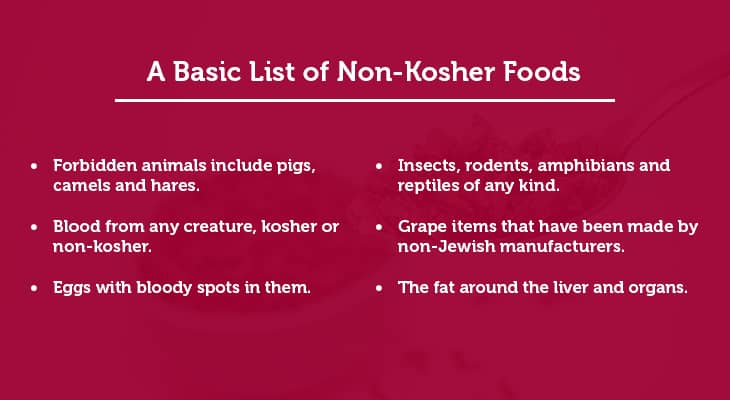
What foods are eliminated in a kosher diet? These are some of the most important:
- Forbidden animals include pigs, camels and hares. In some cases cattle may be deemed unfit for kosher cooking if their lungs have adhesions, which can only be determined through an examination after slaughter.
- Blood from any creature, kosher or non-kosher. If you see blood on your meat or plate, do not eat it.
- Eggs with bloody spots in them. If the bloodied egg has been cracked into a pan, the pan immediately becomes non-kosher and must be thrown out.
- Sciatic nerves and related blood vessels from creatures. Because these can be tough to remove from a creature, many butchers simply sell the parts of the creature that contain these items to non-kosher sources.
- Insects, rodents, amphibians and reptiles of any kind. (This shows why kosher foods tend to be considered more sanitary.) Be aware that if you have an apple tree and you pull an apple off, the apple should be wormless. Many farmers who want their products to be certified kosher run into an issue because of an infested harvest.
- Grape items that have been made by non-Jewish manufacturers. This includes wine, which is mentioned below.
- The fat around the liver and organs. Interestingly, the liver itself can be consumed despite the fact that it is packed with blood. A special koshering process is used to eliminate the contaminated blood from the liver and neutralize any problems.
When in doubt, it is always best to err on the side of caution rather than consuming non-kosher foods if you want a 100 percent kosher diet.
Why Non-Kosher Eaters Choose Kosher Foods
First and foremost, non-kosher followers should always feel comfortable following a kosher diet if they wish. Due to the plethora of rules surrounding kosher foods, those foods may actually be healthier and safer for people. In fact, meat slaughtering laws are strict to the point that the USDA has exempted them from several of their regulations.
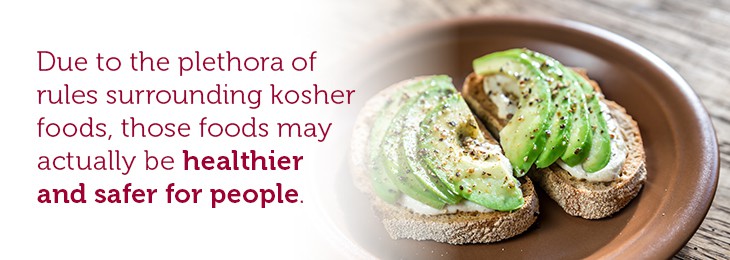
Sanitation is highly important when it comes to producing and selling kosher items. People who know this do tend to gravitate toward ordering kosher when possible, including on airplanes. They know their food is less likely to be exposed to bacteria, thanks to the special kosher seal that’s required on airline food.
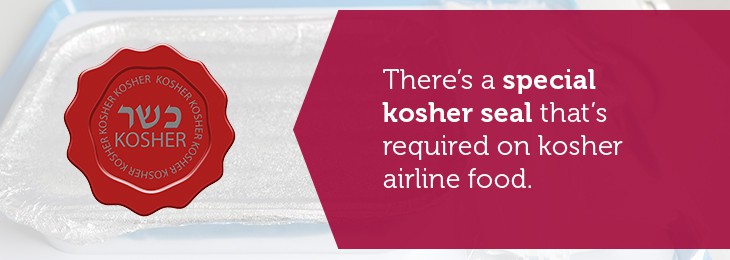
Another reason why non-kosher eaters turn to kosher ingredients is that they have people in their lives who practice kosher eating habits. Perhaps they have married into a Jewish family, or their best friend is of the Jewish faith. Maybe they have a social circle that includes people from multiple faiths and cultures. In order to ensure that dinner parties, get-togethers and gifts are edible, the non-kosher eaters must be tuned into the needs of their kosher brethren.
Of course, one of the most essential reasons to eat kosher is that the food is so lovingly prepared and tastes delicious! Let it never be said that thoughtfulness doesn’t go into kosher foods. Plus, many people are surprised at how healthy they feel when they move to kosher living. They sense that their food has a more flavorful, natural taste that’s missing from other products they eat. Consequently, it’s no wonder that wherever you go, kosher alternatives are on the shelves or menu.
What Is a Kosher Diet Like?
What is it like to live a kosher diet on a daily basis? We’ll start by exploring the realities of a kosher kitchen, which has its own nuances and expectations.
As mentioned before, kosher kitchens have separate utensils and culinary equipment to reduce the contamination of meat with dairy or vice versa. One interesting point to note is that contamination of utensils can only occur if the food is hot, spicy or heavily seasoned. For instance, if you were to use a spoon to eat a bowl of ice cream (dairy), and you washed the spoon (with only dairy utensils, plates, etc.), it could then be used to eat a meat-based cold dish. However, if you used a ladle to serve hot chicken noodle soup, you could not wash the ladle and use it later with any dairy products, because it already touched a heated kosher meat food.
As you might imagine, it can be a challenge to keep a kosher kitchen in order! Additionally, keeping the stove, sink and countertops kosher requires incredible determination. Again, this circles back to one of the reasons why kosher is preferred: it promotes high degrees of sanitation. A dirty kitchen is bound to become non-kosher rapidly. You will often discover that kosher kitchens (and this includes manufacturers that produce, make and ship out kosher foods) are squeaky clean out of necessity.
The dishwasher is a modern convenience, but meat and dairy dishes and utensils cannot be cleaned simultaneously. Some Jewish families simply clean all the meat items and then run the dishwasher empty before cleaning the dairy items. Others will invest in two dishwashers just to make sure they cover their bases. A third option can be to have separate dishwasher racks for meat and dairy.

Other household products the kosher kitchen needs are towels, sponges and pot holders. Again, these should be separated and not mixed. To make it easier, it’s wise to choose particular color schemes for meat, for dairy and for pareve (neutral) foods and items.
An Example of a Kosher Meal
Although it might seem complicated, creating a kosher meal is no different than planning a menu for any other type of meal. It all begins with building a nutritionally sound source of kosher foods, such as a meat or seafood, paired with kosher bread and vegetables. If dairy is included, it must be done so several hours after the meal to reduce an accidental mix-up of dairy and meat.
Does this limit a kosher diet? Not at all! Kosher recipes abound, and are as tasty as dishes from any other culture. The only difference is that all the products have been certified by a trustworthy source, and are not eaten in forbidden arrangements.
Worried that you might miss out on desserts when eating kosher? Banish the thought! There are tons of kosher dishes and off-the-shelf products that will satisfy your sweet tooth, from macaroons to dark chocolate candies.
Buying Kosher Gifts for Friends and Family
If you know or suspect someone in your life follows a kosher diet, you may want to lean toward always buying kosher gifts. That way, you’ll be assured that anyone, whether a kosher or non-kosher eater, can enjoy the edibles. You’ll also feel better because you’ll know the basics of how the products have moved through the supply chain. This transparency is a true benefit of buying kosher. There is simply no room for deception in the practices, because they are so well laid-out.
When you’re searching for kosher items, always look for companies that promote all their items as “100 percent certified kosher.” This ensures no non-kosher items could mistakenly be included. Plus, it gives you peace of mind when sending treats to those you care about. The last thing you want is for your recipient to be unable to eat something because the gift was not entirely kosher.
What are some excellent choices for kosher gifts? Obviously kosher gift baskets, boxes and trays of kosher goodies, including wine if desired, are fantastic options. Not only can they be eaten by the recipient, but they can also be shared with others around them. This is especially great if you’re planning to send a gift basket to a group of religiously diverse coworkers at the office, a vendor, a client or even a neighbor. You might just hear that your gift was especially well received because it was kosher! Check out our variety of corporate gift baskets.
Besides, gift baskets are an extremely affordable type of gift because they can be made to your specifications. You never have to break your budget!
Is It Kosher? Answers to Your Food Questions!
At this point, you may be wondering whether some of your favorite foods are kosher or not. See our answers below to determine if you can still indulge in the treats you love so much!
Is Chocolate Kosher?

As you can guess from the description of kosher food items throughout this article, chocolate can be kosher. It also may not be kosher. It simply depends upon the ingredients you use to make the chocolate, as well as the places where the chocolate is created.
Chocolate starts with the cocoa bean, which is kosher as long as it isn’t infested by any insects. As for the other ingredients that go into chocolate, you can consider milk, sugar and flavorings independently. None of these ingredients is inherently banned in kosher eating. However, chocolate with dairy content will necessarily fall into the “dairy” category. Thus, it should not be eaten with any kind of meat product.
Beware, too, of chocolate-covered non-kosher products. For instance, a kosher chocolate covering a piece of bacon (yes, this exists) or an insect (think of chocolate-covered ants or grasshoppers) would definitely not be kosher. Remember the rule that if something kosher touches something non-kosher, it immediately becomes tainted and therefore non-kosher.
Is Candy Kosher?
Candy is an interesting product because some confectionaries are made using gelatin, which can be problematic. Gelatin is sometimes sourced from non-kosher places, such as pigs or even from animals that have not been slaughtered using acceptable kosher methods. Therefore, it’s critical that any candies made with gelatin, such as gummy candies or marshmallows, be produced using kosher gelatin.
A second potential issue is that candies can contain a variety of ingredients. Never assume that your candy seems to be kosher just because you scanned the list of what was used to make them. Some ingredients actually contain non-kosher parts, but are grouped together for ease. This means they may look kosher at first blush, but are non-kosher in nature.
An example of this conundrum is the abundance of candies that include a blanket ingredient called “natural flavors.” This is not good enough for those who want to eat kosher. It’s important to know more. “Natural” has no place as a definition when it comes to kosher foods. A “natural flavor” sounds innocent, but could be derived from civet or castoreum. Not familiar with those two sources? They come from felines and beavers, respectively, and are decidedly not kosher.
When purchasing candy for yourself or others, look for markings indicating that your product is kosher. That way, you won’t have to wonder. And yes, there are candies of all shapes, sizes and flavors to make you smile!
Is Wine Kosher?
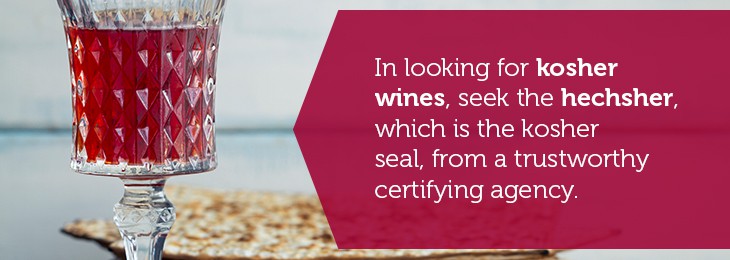
Even if your wine was handled in a way that seems perfectly kosher to you, it isn’t actually kosher unless it has been made by Sabbath-observing Jews. Ideally, the winemakers should be supervising everything from the grape harvest to the production to the fermentation. They might even have a hands-on part in the wine-making process. (Some kosher eaters insist upon the latter.)
Grapes are basically kosher, as long as they have not been infected by insects. Therefore, the foundational element of wine is kosher. It just gets trickier the more you look into the steps that are necessary to turn a sweet grape into a fermented beverage.
For instance, many wine makers regularly turn to casein and gelatin. These are not permissible in a kosher diet. Therefore, only kosher enzymes or forms of bacteria can be used. Additionally, all the casks, bottles, equipment, etc. must be kept under kosher sanitary conditions.
In looking for kosher wines, seek the hechsher, which is the kosher seal, from a trustworthy certifying agency. Passover wines are particularly notable, because they have gone through a secondary line of consideration: they have never touched bread, dough or grain.
Is Beer Kosher?
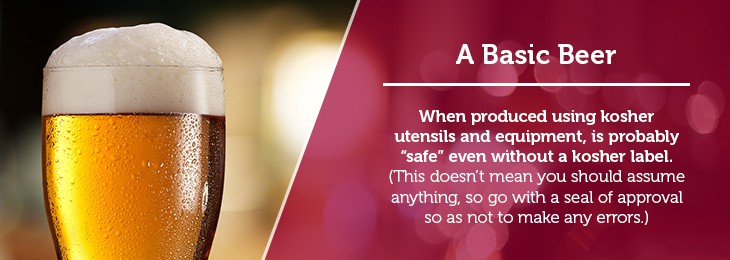
Like wine, beer is a fermented product and it too can be made in a non-kosher or kosher fashion.
Nothing in the basic ingredients that go into beer raise any alarm, as long as they have been properly harvested. Thus, a basic beer, when produced using kosher utensils and equipment, is probably “safe” even without a kosher label. (This doesn’t mean you should assume anything, so go with a seal of approval so as not to make any errors.)
The problem with beer comes when additions are made. For instance, many of the newest beer makers are exploring exotic flavors and tastes. While there is certainly nothing against beverage-making innovation in the Torah, there could be a problem if the additions are not from kosher sources. Oysters and casein come to mind, and may be used to add specific tastes to beer.
Be wary of any inclusions in your favorite beer if you’re looking for a kosher adult beverage. Read the labels. If a beer has not been certified kosher, find out why. Many beer companies have robust websites and may have answers to your questions.
Want More Kosher Knowledge? Just Ask!
In putting together this article on kosher foods, we know we couldn’t cover everything readers might want to know. That’s why we’re asking for your assistance. If you think we need to go into more detail on kosher versus non-kosher foods, kitchens, preparation and related topics, please drop us a line. We’d love to hear from you and help you better understand the realities of kosher diets and kosher living.




















